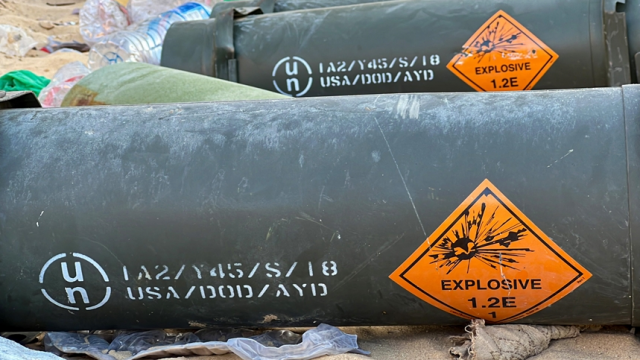US and Germany lead as the top arms suppliers to Israel
Despite global condemnation, these nations continue to provide military support, intensifying the suffering in Gaza.

Israel's ongoing war on Gaza, now stretching into its 10th month, has been marked by severe civilian casualties and widespread destruction, significantly fueled by Western arms.
Germany, as the second-largest arms supplier to Israel after the US, plays a major role in exacerbating the crisis.
Despite global condemnation and calls for an end to arms sales, Germany, alongside the US, Italy and the UK, continues to be main suppliers of military equipment that intensifies the violence and suffering in Gaza.
These weapons have been used to kill more than 38,000 Palestinians in Gaza, and lay waste to almost the entire besieged enclave, where Israel has also imposed a crippling blockade on supplies of food, water, medicine, and all humanitarian essentials.
These Western nations, particularly the US, Germany, Italy and the UK, have paid little heed to calls from top humanitarian officials and experts in all spheres, pushing ahead with military supplies to Israel despite the very real possibility of being guilty of aiding and abetting a genocide.
For instance, back in April, the UN Human Rights Council approved a weapons embargo on Israel, with 28 countries voting in favor, six against, and 13 abstentions.
Among those who opposed the proposal were the US and Germany, who are Israel’s top two sources of weapons.
What follows is a breakdown of the weapons and military support these countries are providing to Israel.
US
As the leading arms supplier to Israel, the US provided 69% of Tel Aviv's imports of conventional weapons between 2019 and 2023, according to a report by the Stockholm International Peace Research Institute (SIPRI).
Since last Oct. 7, when the recent conflict in Gaza began, the US has significantly bolstered its military support for Israel, approving and delivering over 100 separate foreign military sales.
This substantial aid includes a wide array of weapons and munitions such as air defenses, precision-guided munitions (PGMs), artillery shells, tank rounds, and small arms, the Washington-based Foundation for Defense of Democracies (FDD) reported.
The Pentagon also leased back two Iron Dome batteries to Israel and transferred Tamir interceptors from the US inventory.
Additionally, Washington provided large quantities of Joint Direct Attack Munitions (JDAMs) and Small Diameter Bombs (SDBs), and approved a sale of SPICE guidance kits to enhance Israel's precision strike capabilities.
Other deliveries included 155mm artillery shells, Hellfire missiles, 30mm ammunition, and 120mm tank rounds. Small arms and equipment, such as PVS-14 night vision devices and Bunker Defeat Munitions, were also supplied.
Israeli media also reported that at the end of January, Washington was planning to sell F-35 aircraft, Apache attack helicopters, Sikorsky UH-60 Black Hawk and SH-60 Seahawk helicopters, drones, M109 howitzers, M270 multiple launch rocket systems, Fighting Falcon F-16s, and thousands of artillery shells to Israel.
By the end of March, the Biden administration had also approved a $2.5 billion sale of 25 F-35s and aircraft engines to Israel.
This package also included the delivery of 1,800 MK-84 unguided bombs and 500 MK-82 unguided bombs.
The US and Israel also signed an agreement on June 4 for the sale of 25 F-35 aircraft.
Germany
Germany is the second-biggest weapons exporter to Israel in terms of major conventional weapons, with over 25% of imports between 2019 and 2023.
Berlin has mainly supplied Israel with submarines, warships, vehicle and aircraft engines, and torpedoes, often covering a third of the cost as military aid, according to data from Workers in Palestine.
Germany had already approved €326 million ($352 million) worth of arms exports to Israel before Oct. 7, and has continued to permit licenses for military equipment like training ammunition, Berlin-based Forensis reported.
These licenses also include military technology, electronic equipment, vessels of war, special naval equipment, bombs, torpedoes, rockets, missiles, and other explosive devices.
In 2023, Germany made substantial arms exports to Israel, including two Sa’ar 6-class corvettes, 10 DM2A4 Seehecht torpedoes for Dolphin submarines, and numerous diesel engines for various military vehicles, as reported by SIPRI.
The Sa’ar 6 corvettes, partially funded by the German government, became operational during Israel's current offensive in Gaza. These warships have actively participated in offshore strikes and contributed to the Israeli Navy’s blockade of Gaza.
The Eitan Armoured Personnel Carrier (APC), powered by German diesel engines, was fast-tracked into operational status in Gaza. Both the Eitan and its infantry fighting vehicle counterpart have been deployed on the front lines, supporting Israeli forces in urban assault operations.
Germany also exported diesel engines for Merkava-4 tanks, which are integral to Israel’s ground invasion. Since last October, these tanks have been used in attacks on civilians and infrastructure in Gaza.
This January, German newsweekly Der Spiegel reported that Berlin agreed to supply Israel with 10,000 rounds of 120mm tank ammunition from its military stockpiles, following an Israeli request last November.
Italy
Italy is the next biggest arms exporter to Tel Aviv, making up 0.9% of Israeli imports from 2019 to 2023, according to the SIPRI report.
In the last quarter of 2023, Italy exported weapons and ammunition to Israel worth €2.1 million, according to Italian media.
"In December alone, now in the midst of the bombings by the Israeli army and air force on the Gaza Strip, with catastrophic consequences for the civilian population, Italian exports reached 1.3 million euros, thus marking the peak of the period (against 233,025 euros in October and 584,511 in November)," Italian news magazine Altreconomia reported.
According to Italy's National Statistics Institute (ISTAT), a notable portion of these exports pertains to categories such as rifles, spring guns, and similar weapons utilizing compressed air or gas.
Meanwhile, a substantial €430,000 are attributed to parts and accessories for a wide array of firearms, including machine guns, revolvers, pistols, and other devices.
UK
Foreign Secretary David Cameron announced in April that the UK would not halt arms sales to Israel following a thorough examination of the most recent legal guidance amid the ongoing humanitarian crisis in Gaza.
British companies such as BAE Systems remain engaged in supplying weaponry to Israel, including components for its F-15, F-16, and F-35 fighter jets, London-based Action on Armed Violence reported.
The UK supplies about 15% of the F-35 stealth bomber components in currently use in Gaza, according to Human Rights Watch.
In addition, there are 28 active and 28 pending UK military equipment licenses that could be used by Israel in Gaza.
However, Defense Secretary Grant Shapps claimed that UK's defense exports to Israel are “relatively small,” totaling £42 million ($53.5 million) in 2022.
According to data from the Campaign Against Arms Trade (CAAT), the UK has authorized arms exports valued at £560 million to Israel since 2008.
“This does not capture the full scale of UK military exports to Israel as many arms export licenses to Israel are ‘open’ and there is no cap on the number of licensed exports or their value; and many licenses are for the USA, for incorporation into bigger weapons systems for onward export to Israel," said a CAAT report.
“The most traceable exports from the UK to Israel are components for the F-35 fighter jet and the F-16 – both of which are used by the IDF (Israeli Army) in Gaza,” it added.
CAAT said in another report that the UK defense industry supplies 15% of the components used in the F-35 stealth combat aircraft, which are “currently employed in the bombardment of Gaza.”
According to CAAT estimates, the value of the components supplied by the UK has been at least £336 million since 2016.




1644560129-0/download-(20)1644560129-0-208x130.webp)













COMMENTS
Comments are moderated and generally will be posted if they are on-topic and not abusive.
For more information, please see our Comments FAQ